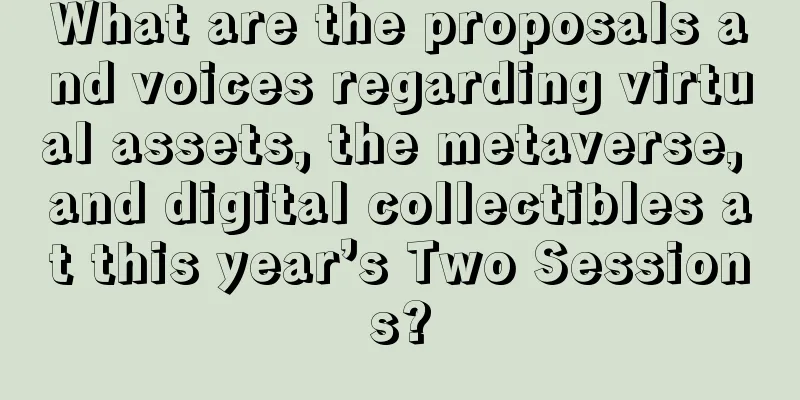What are the proposals and voices regarding virtual assets, the metaverse, and digital collectibles at this year’s Two Sessions?

|
During the 2023 National People's Congress and the Chinese People's Political Consultative Conference, deputies to the National People's Congress and members of the Chinese People's Political Consultative Conference continued to pay attention to virtual assets and metaverse-related industries. Among them, issues such as the supervision and legislation of virtual assets and digital collections became the focus of the deputies' attention. However, compared with the number and popularity of dozens of proposals on blockchain, metaverse, etc. in 2022, the representatives spoke less this year. According to public information, there are about 7 such proposals and occurrences today, of which 3 are about the supervision and legislation of virtual assets, 2 are about the standardization of space industries and technologies, and 2 are about the supervision of digital collections and the integration of physical scenarios. Digital RMB, virtual asset regulation and lawFu Xiguo, deputy to the National People's Congress: In the field of preventing financial risks, we must guard against virtual currency risks and clarify the legal responsibilities for the production and issuance of digital tokens. Fu Xiguo, deputy to the National People's Congress and president of the Shenyang Branch of the People's Bank of China, plans to submit a proposal to amend the Law of the People's Republic of China on the People's Bank of China at the 2023 Two Sessions. He said that in recent years, the domestic and international economic and financial situation has undergone major changes, the financial system reform has continued to deepen, and the Party Central Committee and the State Council have also made corresponding adjustments to the functions of the People's Bank of China. The current legal provisions can no longer meet the objective needs of economic development and the performance of the People's Bank of China's duties, and it is necessary to revise them. Fu Xiguo suggested that, first, the legal status of the People's Bank of China as a macro-prudential manager should be established; second, the regulatory function system should be improved and the legal basis for performing duties should be strengthened; third, the form of the digital RMB should be specified and the legal basis for its issuance should be clarified; fourth, the regulation of financial illegal activities should be strengthened and relevant legal responsibilities should be improved. He believes that the management responsibilities of the RMB should be improved, and the forms of expression and production methods of the legal RMB should be redefined in legal provisions, so that the digital RMB should be given the same legal status as the physical RMB; based on the characteristics of the digital RMB, the issuance method, circulation method, and supervision method of the digital RMB should be comprehensively and detailedly stipulated. In the area of preventing financial risks, he also suggested guarding against virtual currency risks and clarifying the legal responsibilities for the production and issuance of digital tokens. Wu Yiqiang, member of the National Committee of the Chinese People's Political Consultative Conference: Give full play to the technological advantages of digital RMB smart contracts in stimulating consumption, education services, tax exemption, and payments by foreigners. Wu Yiqiang, member of the National Committee of the Chinese People's Political Consultative Conference and President of the Tianjin Branch of China Construction Bank, suggested that in 2023, the technological advantages of digital RMB smart contracts can be leveraged in the precise issuance of consumer vouchers, prepayment supervision of the education service industry, sales of duty-free goods, payment experience for foreigners, and cruise home port applications, to vigorously promote consumption upgrades and expansions, and enhance the convenience of travel, business, duty-free, etc. Pi Jianlong, member of the National Committee of the Chinese People's Political Consultative Conference: Accelerate the special legislation for the protection of online virtual propertyPi Jianlong, member of the 14th National Committee of the Chinese People's Political Consultative Conference and director of Beijing Jintai Law Firm, plans to submit a proposal to the two sessions on "speeding up the special legislation for the protection of online virtual property". This proposal believes that the conditions for special legislation for the protection of online virtual property are basically mature, and recommends that the National People's Congress include the "Online Virtual Property Protection Law" in the legislative plan as soon as possible and start the relevant legislative process. He explained that online virtual property is currently in a legal regulatory vacuum and needs to be governed by legislation as soon as possible to build a suitable legal framework for it, clarify the legal attributes, status and relief mechanisms of online virtual property, and ensure the safe and stable development of related industries. Many countries and the European Union attach great importance to the development of virtual property and have formulated relevant regulations. Asset digitization is an inevitable choice for the development of a new digital economy. The third generation of the Internet lists data and virtual property as important supports, and believes that the next generation of the Internet will be a value network. Blockchain, smart contracts, oracles, metaverse, artificial intelligence and other technologies are important technologies for asset digitization. Accelerating the special legislation for the protection of online virtual property is not only necessary to enhance national competitiveness, but also necessary to protect the rights and interests of the people, and it is also necessary to strengthen supervision; China's virtual property needs to develop its own technology and formulate laws and regulations that conform to China's national conditions to enhance our country's international competitiveness in the next generation of the Internet and the new digital economy. National People's Congress Representative Feng Fan: Special legislation on data and network virtual property should be initiated as soon as possibleFeng Fan, deputy to the National People's Congress and director of Grandall Law Firm (Nanchang), said that at present, the digital economy is becoming an emerging strategic point for global resource elements in the next stage, and is also a development field that all countries attach great importance to; asset digitization is an inevitable choice for the development of a new digital economy. Due to different national conditions, the model of overseas asset digitization is not suitable for promotion in China. Therefore, China's virtual property needs to develop its own technology and formulate laws and regulations that conform to China's national conditions, and it is necessary to start special legislation on data and network virtual property as soon as possible. The country has standardized measures to regulate financial assets, but there is still a legal vacuum for non-financial virtual property. The Civil Code, which will be officially implemented in 2021, is the basis for subsequent special legislation on data and network virtual property. However, the current provisions of the Civil Code cannot be used as a direct basis for resolving specific disputes. Feng Fan suggested that laws should be adopted to clarify the definition and scope of data and network virtual property; clearly define the legal status of relevant entities in the field of data and network virtual property, regulate their behavior, and promote open and healthy development of the industry. "We can also encourage and support local governments to introduce 'first-come, first-served' laws and policies, and to legislate first to play the role of reform test fields, so as to accelerate the development of metaverse technologies such as Chinese-style non-financial Web3 in various places." Feng Fan pointed out that guiding relevant groups and institutions to speed up the formulation of technical standards for various types of data and network virtual property (including software, hardware, services, etc.), and promoting independent technological innovation through standardized technology to regulate data and network virtual property business and behavior can also effectively promote the development of China's digital economy. In addition, Feng Fan also suggested that the country establish multiple online virtual property custody centers and certification centers, establish a protection mechanism for the purchase of domestic online virtual property, and support consumers in confirming their ownership of domestic online virtual property; at the same time, promote and encourage the digital financial insurance system to safeguard the legitimate rights and interests of non-financial online virtual property issuers, trading platforms, and investors. Metaverse must prevent "decoupling from reality" and guide technology standardizationWu Jiezhuang, member of the National Committee of the Chinese People's Political Consultative Conference: "Guide the Metaverse to 'transform from virtual to real' and serve the real economy." Wu Jiezhuang, a member of the National Committee of the Chinese People's Political Consultative Conference and a member of the Legislative Council of the Hong Kong Special Administrative Region, submitted a proposal on promoting the healthy development of the metaverse industry at this year's two sessions. He proposed that the development of the "metaverse" should not overemphasize the creation of consumer-grade virtual space, and should prevent "de-materialization" and waste of resources under the capital boom; the application of digital twins, 3D imaging and other technologies under the development vision of the "metaverse" should be encouraged in the fields of intelligent manufacturing, smart medical care, smart cities, etc., to promote emerging technologies to better serve the development of the real economy, further innovate social governance models, and improve the level of intelligent public services. Wu Jiezhuang said that at present, there are challenges in the development of the metaverse industry. On the one hand, the "double-edged sword effect" of advanced technology is prominent, and traditional information security and ideological protection are challenged. On the other hand, there is currently a lack of mature supervision on the capital operation mode of the metaverse, virtual world financial payments, and NFT. At present, the development of the metaverse in the United States is relatively fast, and my country is close to it in concept and has a large market. Japan, South Korea and other countries are also actively promoting the development of the metaverse. To this end, Wu Jiezhuang suggested that my country should learn from the development of "digital currency", attach great importance to the development and governance of the metaverse, actively promote technological progress and infrastructure construction to support the development of the metaverse, and pay attention to the forward-looking governance of the metaverse. He specifically pointed out that the rich digital virtual vision constructed by the "Metaverse" needs to be supported by solid underlying technology, and it is necessary to prevent excessive concentration of funds in the application layer under the concept of the "Metaverse", resulting in the future "Metaverse" upper-level applications still being based on American corporate technology. The proposal also suggests conducting preliminary research on the security governance system for the "Metaverse"; strengthening supervision and guidance of the development of the Metaverse, accelerating the research and formulation of relevant laws and regulations; and encouraging domestic companies to break through the technical bottleneck of the "Metaverse". National People's Congress Representative Min Weidong: Establish standardized processes to ensure that various technologies in the Metaverse are compatible with each otherMin Weidong, deputy to the National People's Congress and director of the Metaverse Research Institute of Nanchang University, put forward suggestions on further promoting legislation in the field of artificial intelligence at the two sessions and expressed his views on the development of the metaverse. "The Metaverse still has a lot of room for development in the future. It will become more real, free, extensive, complete and intelligent. The Metaverse can be widely used in games and entertainment, virtual malls and shopping, social networks and chats, education and training, health care, architecture and design, financial services, smart cities, Metaverse data value mining, etc. It can provide people with rich services and experiences, and can also generate new formats and models." "There are still technical bottlenecks in the development of the metaverse. There are many core technologies that need to be solved in metaverse head-mounted displays, near-eye displays, natural interactions, and large-scale scene generation." Min Weidong pointed out that the current standardization and regularization of metaverse technology is still relatively weak, and standardization work needs to be strengthened to ensure that the various technologies of the metaverse are compatible with each other. In addition, the popularization and promotion of the Metaverse requires increasing the number of people participating in the Metaverse market, and formulating relevant laws, regulations and policies to ensure the security of data, information and property involved in the virtual economy and applications in the Metaverse. Regarding the future development of the Metaverse, Min Weidong said that through core technology innovation and the construction and improvement of the virtual ecosystem, it will support more realistic virtual experiences, smarter interaction methods, freer social interactions, broader application scenarios, and a more complete virtual economic system. Clarify the supervision of digital collections and effectively guide the cultural tourism industryNational People's Congress deputy Feng Qiya suggested: clarify the regulatory body of digital collections and implement an access system for digital collection platforms. Feng Qiya, deputy to the National People's Congress and chairman of Shanghai Xinling Investment Holding Co., Ltd., said in an exclusive interview with a reporter from Shanghai Securities News: While the digital collection industry is developing rapidly, current supervision is still mainly based on industry self-discipline and local regulations. There is a lack of a top-down regulatory system coordinated by multiple departments, and the legal characterization of digital collections is still unclear. She said that in the distribution of digital collections, cultural and copyright regulatory departments should strengthen copyright protection and market access management of digital collections to ensure the authenticity and legality of copyrights of digital collections. For key links such as transactions and circulation, local financial regulatory departments should take the lead in supervising digital collection platforms, focusing on combating illegal speculation and hype, and strictly preventing the financialization and securitization of digital collections. In response to the current problem of the lack of corresponding entry barriers in my country's digital collections industry, Feng Qiya suggested: Establish an access mechanism and implement an access system for digital collections platforms. For the issuance, circulation, sale and other links that may involve digital collections, a whitelist mechanism can be established first, and gradual innovation can be carried out in an exploratory manner. In addition, platforms that carry out digital collection business should obtain blockchain information service registration and obtain corresponding qualifications. In addition, she also advocated the establishment of a digital collection transaction information disclosure platform to disclose information such as the issuance process and issuance price, so that investors can understand the market situation and risk situation. Platform companies are actively encouraged to carry out innovative behaviors, establish relevant industry alliances for the digital collection industry, promote industry self-discipline, formulate self-discipline norms, and strengthen industry self-discipline and supervision. National People's Congress representative Yan Meirong suggested: the introduction of laws related to digital collections to effectively empower the development of the cultural tourism industryYan Meirong, deputy to the National People's Congress, vice-chairperson of the Shanxi Provincial Committee of the China Democratic League, and deputy director of the Standing Committee of the Taiyuan Municipal People's Congress, suggested in a recent interview that relevant laws and regulations on digital collections should be introduced as soon as possible to effectively guide the development of cultural and tourism digital collections and the healthy and standardized development of the industry. Yan Meirong said that at present, there are still many shortcomings in the application of China's digital collections in the integration of culture and tourism. Relevant departments have insufficient understanding of digital collections, there is a lack of relevant policy support, and there is a lack of market-oriented means and incentive mechanisms. Cultural and tourism digital products and related cultural resources have not been effectively explored and utilized, and there is serious homogeneity, insufficient product innovation, and a lack of regional cultural characteristics and relevant development professionals who understand both technology and cultural and tourism knowledge. The innovative integration of "Digital Collections+" with tourism, museums, and intangible cultural heritage can "boost" the tourism industry, "revitalize" museums, "shine" on city IPs, and "spread" traditional culture among young people. To this end, she suggested formulating and improving relevant policies, issuing implementation plans for "digital collections + tourism + cultural relics + intangible cultural heritage", and incorporating urban digital IP into urban development strategic plans; strengthening supervision of distribution platforms, product quality, etc., and strengthening the content and value of collections. |
>>: Silicon Valley bank run and the 36-hour journey of the Federal Reserve's rescue
Recommend
Is it bad to have horizontal lines on the root of the nose? How to resolve it?
In terms of facial features, there are some imper...
Is it good or bad to have writing lines on your palm?
Is it good or bad to have writing lines on your p...
Is the personality of a person with goldfish eyes good? What is the fate of a person with goldfish eyes?
Goldfish eyes, commonly known as big bubble eyes,...
Analysis of Bitcoin Supply Indicators in 2022
2022 has passed, the crypto market has experience...
Analysis of the symptoms of mole lesions!
Moles are very familiar to people. Moles are a ki...
These people like to pretend to be arrogant.
People who pretend to be something actually have ...
What’s Next for U.S. Crypto Regulation?
I’m in Davos right now, and U.S. President Donald...
How to tell fortune by looking at birthmarks
Did you know that birthmarks can tell fortunes? T...
A man who appears to be gentle and considerate but is only trying to take advantage of the other person
There is no free lunch in the world. When others ...
Losing both the wife and the army? Filecoin miners should avoid the minefield
The principles of Filecoin mining have been expla...
The facial features of getting rich first and then getting poor
The facial features of getting rich first and the...
The defendant suffered a huge loss! The judge said that 3,000 bitcoins are not currency
Earlier this month, CoinDesk reported that the U....
What does Wu Qu in Fude Palace represent?
Wu Qu star, resolute and decisive, hard-working, ...
Girls with nose knots are stubborn
Girls with nose knots are stubborn It has been sa...
Classical Physiognomy--The Secret
Face reading mainly focuses on the diseased parts...









